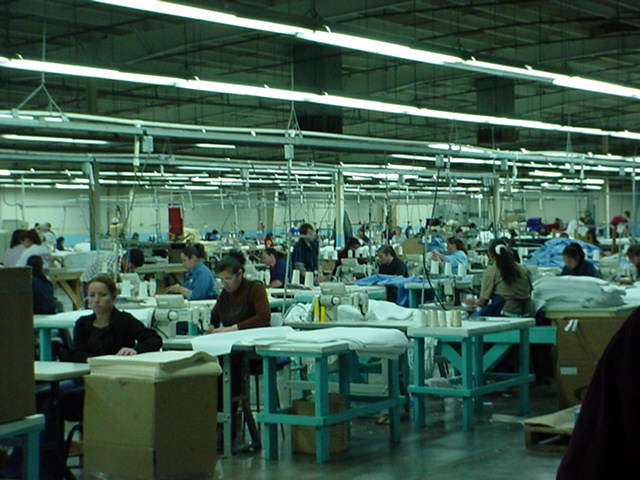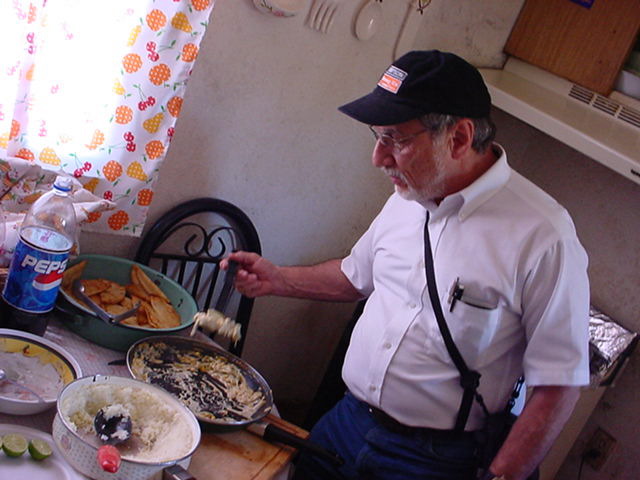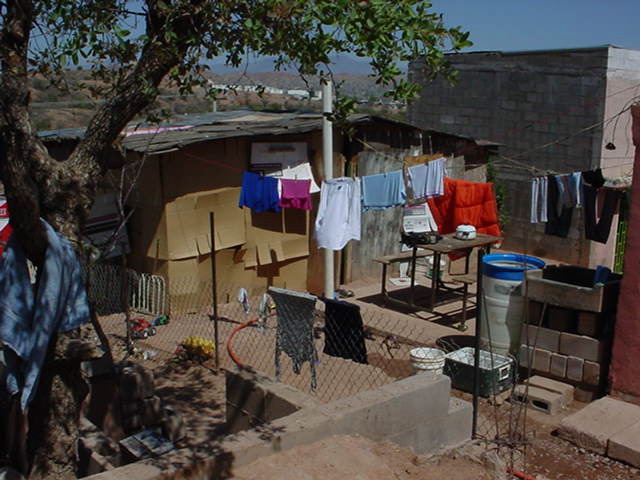

SBS 450 Migration/Culture Border Trip Report by Barry Linder

Textile Maquiladora at Nogales, Mexico
Prologue
On the trip back from Nogales, Mexico our class suffered the tragic loss of one of our students. Two other students and our professor were injured in that same car, which was involved in an accident that was the fault of another vehicle. Our professor left it up to each student to decide whether to write on the emotional experience of the tragedy or to attempt to follow the original intent of preparing a report on a learning experience within the migration theme of the course. I elected to stay somewhat close to the original assignment in order to show that I gained much from the educational experience and tried not to let the tragedy erase all of the long term benefits. Another motivation for this approach was partly as thanks to the professor for giving us the opportunity to observe firsthand the effects on a whole culture of global economic factors at work. However, the recency of the accident did affect the quality of my report and for this I apologize.
Crossing a “Wide” Border
The visit to a border community afforded an opportunity to observe various aspects of transnational activities/affairs. The most significant parts of the visits for me were the tour of an enterprise representative of the global phenomenon of “migrating” factories and the informal presentation to our class by the staff at the local office of BorderLinks Mexico. The tour of a maquiladora1 provided an opportunity to observe some of the factors described in our course readings. The particular plant we toured was described by the guide as a “shelter company” which is a concept that I do not recall from any of our readings. This type of a plant is provided all the equipment, machinery and raw goods for the final product by the American company that retains ownership of such items and also purchases the labor provided by the Mexican factory. The Mexican plant operators bill the owners (with markup) for the labor and the factory space that the plant either rents or purchases. Thus the American company pays the workers’ wages but does not actually hire or deal with the workers in any way.
When discussing how low the wages are the factory tour guide informed us that raising wages would merely motivate the companies to shut down and migrate very quickly to other countries where the local government is more cooperative and thus profits would be maximized for the American owners. He said this would deprive the local workers here of their livelihood. From the course readings I learned that this is true, however, the statement may be very much self-serving as justification to keep the wages low here.
Our tour guide was the manager’s son and informed us that the plant manufactured industrial textiles such as aprons, tablecloths, shower curtains and other similar items for a variety of American firms, all in the same factory. Some of the facts that he presented to us were that most of the workers were women, turnover is usually very high, women applicants for jobs must submit to pregnancy tests, very few unions operate here and there is an unpopular Mexican government union. All of the preceding facts support what we have learned previously in our course readings. However, the guide stated that the pay could reach up to $100.00 per week take-home (if maximum production incentive goals were attained) and that the company pays the insurance premiums for medical benefits. He also claimed that any on the job injuries are completely covered by the plan. These comments, if they are accurate, contradict some of our course reference readings. The guide stated, in response to my question, that women were also in supervisor positions and are only excluded from the “heavier” or physically dangerous work. The latter comment was in agreement with one of the readings. It was interesting to learn that all scrap material must be returned to the country of origin per the NAFTA regulations. The workers are forbidden to take any “waste” material home. Our professor explained to us that this restriction prevented the unwitting assistance (by the factory) to the workers starting their own small-business venture in competition with the maquiladoras for a labor force.
The second most significant part of the trip was the talk given by Kiko Trujillo at the Borderlinks Nogales office. He himself was an industrial engineer, a native of Nogales, had worked in a maquiladora for 15 years and was intimately acquainted with the overall operation and the international ramifications thereof. I was impressed by the fact that he openly offered the observation that the Mexican government was to blame for much of the problems stemming from the presence of the maquiladoras. The maquilas have been in Nogales for over 30 years and originally very simple products were manufactured. Originally the U.S. EPA and the Mexican governments were negligent in allowing many deaths locally due to a lack of pollution controls in maquladoras owned by American firms (ref readings). He said that the situation is much better now.
Kiko revealed that the average maquila wage paid (about $7.00/day) is approximately one and one-half times the local minimum wage. However, that figure includes the salaries of technical staff and managers, which skews the true picture of workers’ income. Privatization of firms has not worked in Mexico and such companies are folding due to the effect of NAFTA. Such American giants as Burger King and Mc Donalds wipe out local burger shops.
The visit to the Mexican government office of their version of a border patrol (Grupos Beta) was disappointing. Although the representative tried in detail to describe the humanitarian enterprise of this federal department it was unclear just how the aid to Mexican citizens attempting unauthorized entry into the U.S.A. was actually administered2. When I inquired if his department was permitted by the U.S. federal government to cross the border to save lives of Mexican citizens in dire need his reply seemed evasive or unclear. Possibly the interpreter was not strictly capturing the speakers intent. Ironically, he did end his presentation by addressing my comments as follows “ I hope you can do something to get the United States to allow us to rescue our people inside your country”. I felt that this was indeed to the point and a worthy concept for a good neighbor to implement. I was impressed by the fact that President Fox had disbanded the entire militaristic form of a border patrol that existed prior to his administration.
Crossing a “Narrow” Barrier
In conclusion, I must admit that the preceding report was from the head. The following is from the heart. The experience of visiting the colonia (neighborhood) and sharing a meal with the owner of one of the small homes was both a cultural and gastronomic treat. The hospitality was warm and gracious, even more impressive considering the tiny and austere space available. Our hostess delighted us with open (translated) conversation and a delicious meal. The latter was unlike what I had usually experienced in typical stateside restaurants and I followed our tour guides earlier advice to ask for seconds (which frankly I would have done anyways). The contrast of the emotional environment inside the home with the extreme poverty of the colonia street and dwellings outside was striking.
Interestingly, when I asked our hostess what beneficial changes she had experienced since president Fox took office she replied “none”.
Addressing the headings of the preceding report, I found the economic gap of the border to be shockingly wide. Thankfully the emotional/cultural barrier was delightfully narrow.
1) This kind of operation is most typically a foreign-owned (American) factory that exports all its manufactured goods directly to the USA. Afterward, the owner may ship those products anywhere in the world. The owner pays no duties to the USA and the laws of both the manufacturing and owner’s countries are (officially) observed. The passage of NAFTA has endorsed and solidified longstanding practices of the border plants as well as having provided the no- tariff benefit.
2) It left the impression that in some vague way the Mexican government was indirectly but intentionally assisting a violation of a sovereign country’s border. He pointed out the rugged vehicles that they operated and used for trips into the difficult and geographically hostile terrain around the border in several places.


Hungry me with a delicious treat. Outside our hostess' home
Return to my B. Linder Home Page index.htm
Return to Migration Home Page